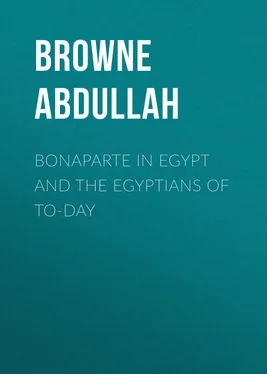Abdullah Browne - Bonaparte in Egypt and the Egyptians of To-day
Здесь есть возможность читать онлайн «Abdullah Browne - Bonaparte in Egypt and the Egyptians of To-day» — ознакомительный отрывок электронной книги совершенно бесплатно, а после прочтения отрывка купить полную версию. В некоторых случаях можно слушать аудио, скачать через торрент в формате fb2 и присутствует краткое содержание. Жанр: Историческая проза, foreign_antique, foreign_prose, foreign_language, на английском языке. Описание произведения, (предисловие) а так же отзывы посетителей доступны на портале библиотеки ЛибКат.
- Название:Bonaparte in Egypt and the Egyptians of To-day
- Автор:
- Жанр:
- Год:неизвестен
- ISBN:нет данных
- Рейтинг книги:4 / 5. Голосов: 1
-
Избранное:Добавить в избранное
- Отзывы:
-
Ваша оценка:
- 80
- 1
- 2
- 3
- 4
- 5
Bonaparte in Egypt and the Egyptians of To-day: краткое содержание, описание и аннотация
Предлагаем к чтению аннотацию, описание, краткое содержание или предисловие (зависит от того, что написал сам автор книги «Bonaparte in Egypt and the Egyptians of To-day»). Если вы не нашли необходимую информацию о книге — напишите в комментариях, мы постараемся отыскать её.
Bonaparte in Egypt and the Egyptians of To-day — читать онлайн ознакомительный отрывок
Ниже представлен текст книги, разбитый по страницам. Система сохранения места последней прочитанной страницы, позволяет с удобством читать онлайн бесплатно книгу «Bonaparte in Egypt and the Egyptians of To-day», без необходимости каждый раз заново искать на чём Вы остановились. Поставьте закладку, и сможете в любой момент перейти на страницу, на которой закончили чтение.
Интервал:
Закладка:
Meanwhile, intelligence of what was happening having been sent to Bonaparte, he had hastened to the aid of the flotilla, but only succeeded in reaching it too late to take any part in the battle. Early the next morning, however, the two armies were drawn up in battle array, and the Mamaluks, with the fearless and impetuous bravery which had always been characteristic of them, lost no time in opening the attack and charged right up to the French line. Their accustomed dash and reckless courage proved, however, of no avail, and they were speedily repulsed by the veterans to whom they were opposed, who kept their ranks unbroken, and waited for the near approach of their foes to pour upon them a galling and destructive fire. Baffled by the stolid calmness of the French, and puzzled by the impotency of their own wild charge, the Mamaluks hastily withdrew beyond the French line of fire and halted, apparently uncertain what course to pursue. In the pause that followed an incident occurred curiously illustrating the widely different ideas and spirit by which the two armies were animated. One of the Mamaluk Beys rode unaccompanied towards the French line, and boldly challenged his foes to single combat; but, for the French at all events, as a French historian cynically remarks, the time for such chivalrous exploits was past, and to the disgrace of the French the daring Mamaluk was shot down on the spot. Discomfited by the repulse they had sustained and with the whole of their forces thrown into disorder, the Mamaluk chiefs decided to abandon the field, and turning their horses' heads retreated precipitately towards Cairo.
Thenceforth the expedition continued its advance without further opposition until within sight of Cairo, always keeping close to the river, not only for the sake of the water, but for that of the more abundant supplies obtainable in its vicinity, and for the mutual support of the army and the flotilla. To carry out these latter objects more effectually a strong detachment was sent across the river to guard the east bank, and to forage in the villages of the Delta. On both sides of the river the troops continued to be harassed by small parties of the Bedouins, who, following all their movements, availed themselves of every opportunity of cutting off stragglers. One of these raiding parties having surprised a junior officer, whom from his uniform and appearance they mistakenly supposed to be a man of high rank, carried him into their camp with a view to holding him for ransom. Bonaparte at once sent a messenger to offer a few guineas for his release. Thereupon a dispute arose among his captors as to which of them should receive the ransom, and was continued so heatedly that the chief of the party, enraged at their obstinacy, declaring that none of them should have it, shot the unfortunate prisoner and sent the ransom back.
As the force moved onwards towards Cairo the heat became daily more and more oppressive and enervating to the troops, to whom, fresh from the genial spring climate of Southern Europe, the fierce and dazzling glare of the sun in the shelterless lands through which their route lay, was little short of an agonising misery. To add to their sufferings the food obtainable was, as before, neither adequate nor adapted to their needs.
It was not until the 20th of July that the army caught its first sight of the pyramids and of the Mokattam hills overhanging the city of Cairo. As they had drawn nearer the capital, the evidence of a greatly increased density of population, and the greater abundance and variety of the supplies they had been able to secure, gave the jaded troops fresh energy and hope. They were still much more than a long day's march from the pyramids when Bonaparte received intelligence that the Mamaluk army was encamped at Embabeh, a village on the west bank of the river, at the spot where it is now crossed by the railway bridge. As it was then evening the army was halted and bivouacked for the night at the hamlet of Om el Dinar, but only to rise and resume its march before the first dawn of day. Animated by the prospect of the combat now but a few hours before them, and which, as they confidently expected, was to gain them a fair reward for all the hardships they had been enduring, the troops pressed onward eager for battle, but it was not until two o'clock in the afternoon that at the end of a twelve hours' march, they found themselves in touch with the enemy.
Learning that the Mamaluks had entrenched themselves in front of the village of Embabeh, and had planted a battery of forty guns in position behind their trenches, Bonaparte decided that it would be necessary to advance in such a way as to be able to attack the enemy's position upon its flanks, and he therefore so disposed his forces that, each division marching in the form of a hollow square, the whole would approach the enemy's position in the form of a crescent, and so that, while the right and left wings would threaten the Mamaluks' flanks, the centre would be prepared to repulse the front attack he expected them to make according to their custom.
Murad Bey, who, with his long white beard covering his breast, was in personal command of the Mamaluks, was not slow to detect the aim of the French General, and quickly ordered Eyoub Bey, one of the best and bravest of the Mamaluk commanders, to advance and attack the division of General Desaix, who was moving round towards the west with a view to outflanking the left wing of the Egyptian position. Eyoub, who had under him a large and fearless, but wholly undisciplined, body of cavalry, at once bore straight down on the French without seeking cover of any kind, and, when within charging distance, dashed upon the French square with the wild cries, brandishing of arms, and tumultuous crowding customary to all Oriental warfare of that day.
Faithful to the orders they had received, the French withheld their fire until the enemy were close upon them, so close that the ruthless rending of the ranks of the Mamaluks by the fierce hail of shot poured upon them was all insufficient to stay their headlong charge, which, bearing down the resistance of their foes, carried them into the centre of the broken square. But the French veterans, always cool and prompt, turned about, and the Mamaluks, finding themselves encircled by their enemies' fire, fought their way back and out of the square, but only to bring themselves under a heavy crossfire from the square and the division of General Kleber, who was moving up to its support. Eyoub's party being thus routed, the French made a direct attack in force upon the entrenched position in front of the village of Embabeh and carried it at the bayonet's point, while the divisions forming the left wing of the attack pushed on between the village and the river. The Mamaluks were thus caught between the horns of a crescent that was threatening to close and entirely surround them. Seeing the danger, Murad Bey at once withdrew his men, and sought the scanty shelter of a grove of date-trees at a little distance from the village. In doing this he was compelled to leave behind him some hundreds of the Mamaluk troops who, caught between the French and the river, utterly unable to defend themselves or to fly, were deliberately shot down by the French or perished in an attempt to escape across the river. As one historian says, it was no longer a fight but a massacre; and thus ingloriously ended what is termed by the Egyptians the "Battle of Embabeh," and by the French the "Battle of the Pyramids," a battle by which the power of the Mamaluks was shattered, and Bonaparte was left for the moment master of Egypt; a battle in which the steady discipline of modern warfare proved once and for all its immeasurable superiority over the wild chivalry of the past; a battle which, apart from this and the vast consequences that have resulted from its issue, is scarcely worthy of remembrance.
Читать дальшеИнтервал:
Закладка:
Похожие книги на «Bonaparte in Egypt and the Egyptians of To-day»
Представляем Вашему вниманию похожие книги на «Bonaparte in Egypt and the Egyptians of To-day» списком для выбора. Мы отобрали схожую по названию и смыслу литературу в надежде предоставить читателям больше вариантов отыскать новые, интересные, ещё непрочитанные произведения.
Обсуждение, отзывы о книге «Bonaparte in Egypt and the Egyptians of To-day» и просто собственные мнения читателей. Оставьте ваши комментарии, напишите, что Вы думаете о произведении, его смысле или главных героях. Укажите что конкретно понравилось, а что нет, и почему Вы так считаете.












